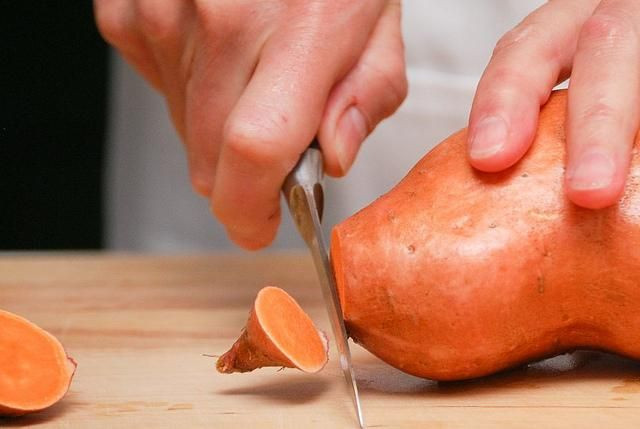Scientists Plan To Maximize The Health Benefits Of Sweet Potatoes

Scientists from North Carolina State's Plants for Human Health Institute are working to get Americans to eat more sweet potatoes, The News & Observer reported.
"In many parts of the world […] sweet potatoes are well recognized as health-protective, nutritious foods," Mary Ann Lila, director of N.C. state’s plants for human health institute, told the Raleigh-based newspaper. "But in the USA, so many people miss this benefit because they only think of sweet potatoes at Thanksgiving and Christmas, served up with maple syrup and marshmallow. The truth is that sweet potatoes are so tremendously versatile and full of health-protective phytoactive compounds that are not appreciated by the general public."
In a recent study Lila conducted with colleague Mary Grace, the two found worldwide the sweet potato is the sixth most important food crop and is a staple food source for many indigenous populations in Central and South America, Japan, Africa, the Caribbean, and more. The health-protective compounds she refers to include phenolic acids, vitamins, B-carotene (one of many disease-fighting carotenoids), and anthocyanins. Plant foods and vegetables don't contain vitamin A, but the human body can convert B-carotene into vitamin A, which helps alleviate deficiencies and night blindness.
But if Americans will only eat sugar-laden sweet potatoes during the holiday season, can Lila and Grace get them to eat up all year round? Easy: They extract three kinds of phytochemicals found in sweet potatoes — phenolic acids, carotenoids, and anthocyanins (only in purple sweet potatoes) — and use them to make sweet potato juice and flour that could be used as functional food ingredients.
Lila and Grace explained their process "produces a stable, dry and powdered ingredient based, where a protein-rich flour is enriched with phytoactives such as fruit polyphenols." These polyphenols bind to other protein-rich flours and ultimately increase concentrations of phenolics.
"The stable polyphenol-protein ingredients … allow the consumer to incorporate sweet potato goodness into recipes that they may not have thought of before," Lila said. "Sweet potato flour can be complexed with health-protective polyphenols from grapes, berries, etc., and used in breads, cakes, pancakes, etc. Sweet potato juice from the purple sweet potato is a superb source of polyphenolic compounds; we complexed these with other types of edible flours to produce shelf-stable, cost-effective ingredients that add to the versatility for menu preparation."
So if Lila and Grace can figure out the exact compounds to use, then they focus on exactly "how to deliver to consumers in ways that are easy, convenient, and innovative." We're talking sweet potato-infused snacks, baby food, and military rations.
Lila added "the search is on for licensing partners" who will incorporate the sweet potato into commercially available foods. Already Carolina Wild Juice has signed a short-term contract with N.C. State to introduce a sweet potato juice. And both Lila and Grace believe there is a demand for this level of innovation.
"Dietary intake of fruits and vegetables has been positively correlated with reduced risk of many chronic diseases, including atherosclerosis, cancer, diabetes, arthritis, and declines associated with aging," they wrote in the study. "As a result, consumers are increasingly demanding functional foods that conveniently capture and concentrate the phytoactive components from fruits and vegetables. The strategy used in this study to create polyphenol and protein-rich matrices was efficient for preserving the integrity and health benefits of polyphenols."
Source: Lila MG et al. Novel value-added uses for sweet potato juice and flour in polyphenol- and protein-enriched functional food ingredients. Food Science & Nutrition. 2015.



























